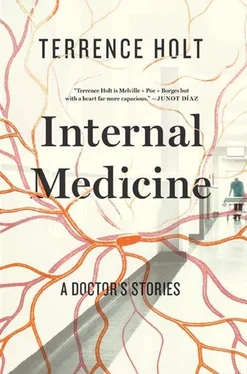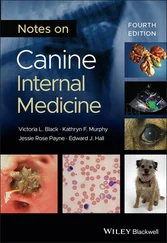But I was making progress. Carefully, I prodded him. “Knew what?”
He moaned. “It’s the crazy house. It’s the crazy house, isn’t it?” He buried his face in the sheet again.
Whatever I’d been planning to say up to that point vanished in an instant, leaving me flat-footed. “Did I”—the voice came muffled through the sheet—“ do something?” The face appeared, eyes reconnoitering nervously above the sheet as the voice dropped confidentially. “It wasn’t murder, was it? I didn’t—”
“No,” I said, a little louder than I’d intended. “You didn’t—”
“Oh, thank God,” he said. “Thank God. As long as I didn’t — you don’t know,” he said soulfully.
“Don’t know what?” There was a lot I didn’t know, but Mr. Jenkins seemed to have something particular in mind. As for me, my head was swimming.
Jenkins had recovered some of his usual equanimity. The look he was giving me now was downright cagey.
“Don’t you know?” he said.
I shook my head. “No, Mr. Jenkins. I don’t know. What?”
“What it’s like. Waking up every day.”
I took a wild guess. “With cancer?”
He turned on me. “What?”
“With cancer,” I said, perhaps a little more brusquely than I’d intended. “Waking up every day with cancer. Knowing about it, I mean. Waking up that way. Knowing. With cancer.”
The expression he gave me had nothing to do with my stumbling delivery.
“What?”
“Cancer.” Repressing panic, I might have been shouting. “You’ve got cancer.”
A long silence, broken by the sound of his breathing. It was getting louder and louder.
“ What kind of doctor are you? ” He was half out of bed, shaking a double-handful of bedsheet in my face. I started to back away.
“What kind of doctor are you?” he demanded again. “Coming in here and telling me something like that? Is that how you tell somebody that kind of thing? You’re lying! You don’t tell me that! You don’t come in here and tell me that kind of shit! Get out! Get out of here!”
By that time I was already out the door. I could hear his shouting all the way down the hall.
How I got through rounds that morning, I’ll never know. Maybe the rest of the team attributed my zombie-like demeanor to the rigors of a rough call night, I don’t know. All I remember was that I watched, as if from an indefinite distance, as the knot of us worked our way around the floor, measuring with growing dread the approach to Jenkins’s room and the moment when I was going to have to face him again. I was listening, too, for the sound of shouts from that direction, wondering if there was any way I could avoid going in that room again. Perhaps I could simply make a run for it, before the moment when the patient reported that I had come in that morning and abused him. What kind of doctor was I?
Helpless in the grip of forces I did not understand, there I stood again finally, at the door of Jenkins’s room, reciting by rote his vital signs that morning, exam findings, the results of yesterday’s tests. I ground down. There was a pause.
“And?” the attending said mildly.
I might have jumped.
“Any progress?”
“Progress?”
Impatience. “You were going to work with him. On his diagnosis. I thought he was having trouble with it. Any luck?”
I shook my head dumbly.
The attending didn’t wait, only nodded and swept open the door to Jenkins’s room. I took a deep breath and followed.
Jenkins was back in bed, looking peaceful enough. The television set was on. Katie Couric was interviewing a woman who looked just like Katie Couric. Mr. Jenkins was rapt.
We all stood for a moment looking at Mr. Jenkins. As the interview cut to a commercial, Jenkins’s gaze turned slowly to us, widening to take in the small crowd wedging into his room. I recognized his expression — the same cagey inventory, twice around his surroundings, the same poker face settling down.
“Hi,” he said shyly.
“Good morning, Mr. Jenkins,” the attending said.
We all stood and looked at each other some more.
“Mr. Jenkins?”
“Yeah?”
“Would you mind if we asked you some questions?”
“Uh-uh.” The commercials were over. Mr. Jenkins’s vision was starting to stray again.
“Can you tell us why you’re here?”
A brief inner consultation. “Sure.” He leaned over and spat into the wastecan. “This,” he said. “It’s been going on for a while.”
“And?”
“Tastes nasty.” He made a face.
“Anything else?”
“Well, yeah. I got this sore throat.” He laid a hand on his chest. “It really doesn’t feel good. I was wondering if maybe I got some kind of ulcer. You know? ’Cause my brother, he’s got ulcers bad. I was wondering if maybe they run in the family? ’Cause if they do, maybe that’s what I got.”
“You’ve got a brother, Mr. Jenkins?”
It was news to me. It was news to all of us. As we left the room, the attending muttered to me, “Call psych. And call the brother.”
Easier said than done, of course. When asked for his brother’s phone number, Mr. Jenkins agreeably recited a string of digits that connected me with a fax machine. When asked again, he wanted to know why I wanted to talk to his brother. “It’s about your ulcers,” I said simply. I was tired. He gave me another string of numbers, which offered the mechanical advice that the number was not in service. On my third trip back I got as far as Jenkins’s door before I realized that the two numbers he’d given me were in different area codes. I spun on my heel, went back to the nursing station, and pulled his chart.
“MR. JENKINS,” I ASKED, “where do you live?”
“Lumberton.”
His chart gave an address in Fayetteville.
“How long have you lived there?”
The expression went cagey again. The eyes narrowed. “Fifteen years. Yeah. Fifteen. Right out of high school.”
I gave that some thought. This was a forty-three-year-old male with pneumonia. Somewhere along the way Mr. Jenkins had misplaced a decade.
“Mr. Jenkins,” I asked slowly. “Can you tell me what year this is?”
“Sure.”
We looked at each other for a minute.
“What year is it?”
“What year? Hmm. It’s — I’m not too good with numbers. It’s a leap year, isn’t it?”
It was in fact a leap year.
“Can you tell me who the president is?”
“I don’t follow politics. It’s a dirty business. But sure.” He looked cagey again. “It’s Bush. George Bush.”
I looked at him, feeling beaten. He looked back at me. A brief standoff, then he coughed self-consciously. The cough turned into a real one, and when he’d recovered his breath, he looked at me again. “What were we talking about?”
We did consult psych. They came by and gave the diagnosis of Wernicke-Korsakoff dementia. He’d completely fried his short-term memory with too much alcohol. By that time, I’d managed to track down the brother, who confirmed what I’d finally recognized, and a little bit more. It had been several years since Charles Jenkins had seen his brother, but he gave the essential outlines of the story. Mr. Jenkins had been in the Navy. He was in fact forty-three years old. But between the ages of eighteen and thirty-eight, he’d hadn’t been sober more than three days at a time. The brother said this with a weary resignation in which I tried but failed to hear a trace of bitterness. I wanted to hear the rest of the story, but Charles Jenkins cut it short.
“When can he come home?”
TWO DAYS LATER. Mr. Jenkins, his cancer thoroughly staged and determined beyond any hope of cure, sits peacefully in the recliner in his room. He is dressed in street clothes. Sunlight is streaming in over his shoulder, he’s breathing comfortably, and the television set is tuned to one of the two hospital channels, which is showing a locally produced documentary about dialysis. When I go in to see him one last time, Mr. Jenkins is watching, rapt. I realize I’m almost looking forward to introducing myself again, if only to say goodbye. And for a moment I watch him, and find myself equally rapt at the sight of him: sick, dying, and eternally unaware. For a moment I am almost envious.
Читать дальше












